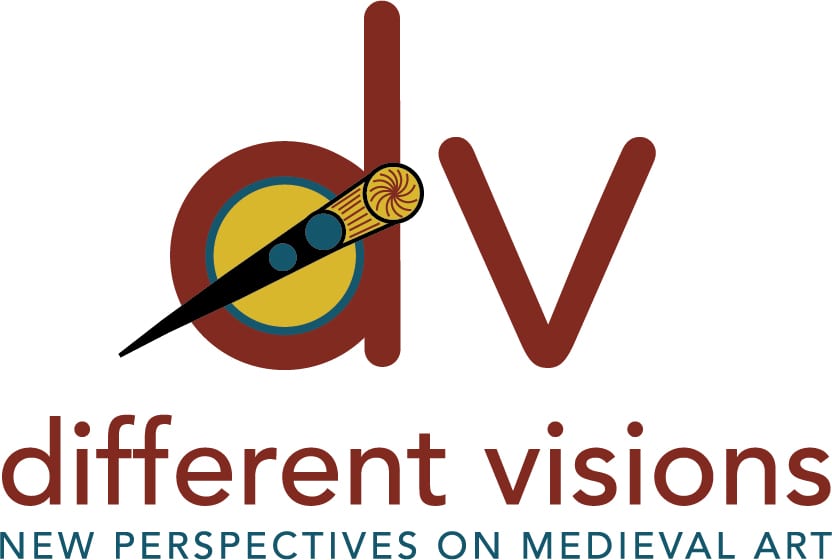Medieval Art History Tomorrow: A Whiteboard Session
Sponsored by Different Visions
Organized by Ben Tilghman, Eliza Garrison, and Nina Rowe
ICMS Kalamazoo, May 9-11, 2024
The Pattern Book of Stephan Schriber, folio 13r, ca. 1494, Urach, Germany. Cod.icon. 420, Munich, Bayerische Staatsbibliothek.
Let’s get together and brainstorm about the future of Medieval Art History!
Which theoretical approaches can best move the field of medieval art history into the future? Which objects or sites are well-suited to analysis energized by current priorities for the discipline? How can we work collectively and systematically to pursue research that realizes anti-racist principles and provides colleagues and students with tools for analyzing social inequity and environmental degradation?
“Medieval Art History Tomorrow” will be a workshop session in which speaker/facilitators offer short presentations on a critical text and an object or site, making the case for how these materials can steer the field, and move it forward. We are especially interested in presentations that reflect upon or sketch strategies for art-historical inquiry that is both socially engaged and intellectually ambitious, particularly those that take seriously social justice goals championed across the humanities in summer 2020 and the continuing environmental crises in which we work and live.
Attendees of the session will be invited to participate in a whiteboard workshop through which we aim to ignite a dynamic discussion and confirm a plan for linked projects to be pursued over the coming years. At the ICMS 2025, participants will reconvene to share findings and refine the project’s goals. At the ICMS 2026, participants will deliver polished papers presenting the research kindled by our discussions and consider next steps.
We invite proposals from colleagues who are eager to work collaboratively and can commit to a project that will build gradually. Presenter/Workshop Leaders should be comfortable orchestrating group discussion and organizing plans for collective work. Abstracts should identify a specific theoretical text that might mobilize the field in productive ways and a particular object or site that is suited to collaborative inquiry informed by anti-racist, social justice and/or environmentalist principles.
What we Envision:
- In the coming months: We will select three Workshop Leaders to guide discussion, working collaboratively with the three session organizers (Ben, Eliza, and Nina).
- In early spring 2024: via public postings and email to registered attendees, we will pre-circulate materials from each Workshop Leader. These materials will include a short critical text excerpt, along with an explanation of a site or object that might benefit from collaborative investigation that will be guided by the theoretical issues explored in the text excerpt.
- At the ICMS: Each Workshop Leader will provide a brief summary of the text and explain why they think it could fruitfully inspire analysis of a chosen object or site, and/or the field of medieval art history in general.
- Ground Rules for the ICMS Workshop:
- We will encourage broad and open conversation about the texts and sites, and will map next steps for a collaborative investigation inspired by the discussion.
- This is a brainstorming session: no idea is dumb. Together, we will work towards bold and creative new ways of approaching our objects of study.
If you want to be a Workshop Leader:
Because our session is designated as a Workshop, we will constitute our panel outside the Confex submission system used by the ICMS. So here are particulars if you wish to submit a proposal to be a Workshop Leader:
Proposal should include:
- PDF of the critical text that will be presented and discussed (no more than 10 published pages).
- An abstract that (a) explains how you think the text you selected has the potential to steer the field of medieval art history in productive ways and (b) identifies a particular object or site that is suited to collaborative inquiry informed by your text and socially-engaged practices.
- A current CV.
Deadline: September 15, 2023, 11:59pm EST
Send materials to: medievalarthistorytomorrow@gmail.com
In the interest of formulating a coherent and dynamic panel, those who submit proposals should expect discussion with the workshop organizers and refinement of plans for the presentations.
If you plan to attend the Workshop:
The Workshop will be the most productive if participants arrive having reviewed the pre-circulated materials, so we request that attendees register in advance. Advance registration is not required–workshop materials will be posted publicly–but will be very helpful to the Organizers and Leaders as they plan the workshop.
Please register by sending an email to: medievalarthistorytomorrow@gmail.com, indicating your intention to attend.
